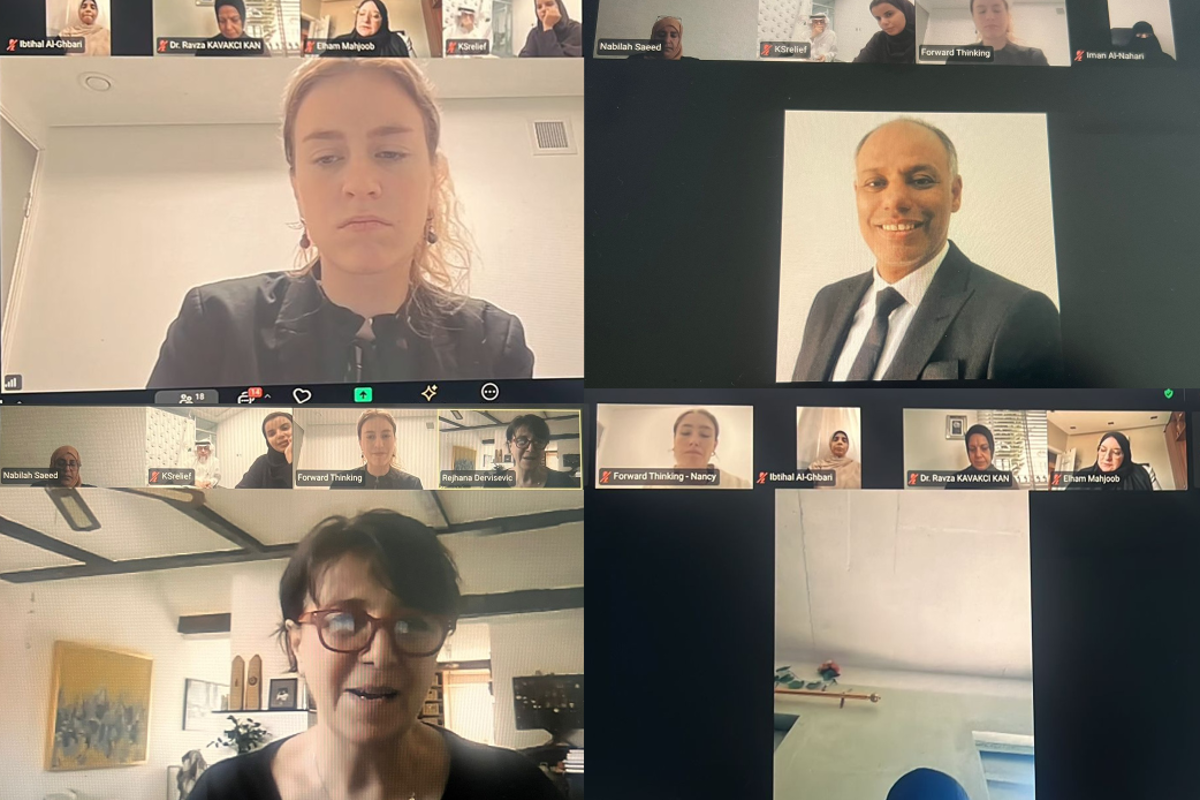Leadership of the Women's Department of the Supreme Council of the Popular Resistance Participates in an International
2025-10-25
Leadership of the Women's Department of the Supreme Council of the Popular Resistance Participates in an International Forum to Discuss the Impacts of the War in Yemen
Yemen: Special
Leaders and members of the Women's Department of the Supreme Council of the Popular Resistance participated in an international online forum featuring female parliamentarians, diplomats, and human rights defenders from the Gulf, the Middle East, and Europe. The forum discussed the humanitarian and political impact of the war in Yemen and the role of women leaders in shaping peacebuilding efforts.
The list of speakers included Yemeni experts, most notably Nabila Saeed, head of the Women's Sector of the Supreme Council of the Popular Resistance; Awsan Mohammed Saeed, head of the Women's Department of the Supreme Council; human rights activist Arej Al-Nabahi, a member of the Department; and psychological consultant Ibtihal Al-Aghbari, head of the Safe Women's Foundation for Development.
During the forum, organized by Forward Thinking, a British non-governmental organization specializing in political dialogue and mediation in the Middle East, Nabila Saeed, head of the Women's Sector in the Supreme Council of the Popular Resistance, addressed the situation of women in Yemen during the war. She emphasized that their representation in the government and local councils does not exceed 5%, and that 80% of them rely on family support or humanitarian aid. She pointed to the doubling of poverty and unemployment among female-dominated households, and that 70% of working women are active in the informal sector.
She also explained that more than 350,000 displaced women and girls face harsh conditions and increasing risks in camps. She noted that there have been more than 350,000 displaced women and girls in government-controlled areas since 2014, according to the United Nations High Commissioner for Refugees.
The head of the Women's Sector in the Supreme Council of the Popular Resistance explained that violations in Houthi-controlled areas exceed those in government-controlled areas, with thousands of cases of killing, arrest, and sexual violence recorded. She emphasized the need to empower and protect women and support their participation in decision-making.
For her part, Osan Mohammed, head of the Women's Department of the Supreme Council of Popular Resistance, presented a comprehensive picture of the educational reality of Yemeni women in light of the war and the Houthi coup. She noted that Yemeni female teachers have become "a symbol of endless suffering," having worked for more than a decade without pay in areas controlled by the Houthi militia and facing stifling economic conditions even in areas controlled by the legitimate government, where their maximum salary does not exceed $80.
She added that girls constitute the most affected group, with international reports showing that more than two-thirds of girls are not in secondary education due to the economic situation, the collapse of the educational infrastructure, and the transformation of schools into military barracks. She emphasized that this means "the obliteration of an entire generation of human potential."
Osan Mohammed emphasized that despite the educational collapse following the Houthi coup, Yemeni women have not surrendered. Rather, they have launched educational initiatives in cities and villages, creating societal and moral pressure on decision-makers. She emphasized that girls' education represents the cornerstone of breaking the cycles of poverty and violence.
The head of the Women's Department in the Supreme Council of the Popular Resistance presented a number of important recommendations, calling for increased international and regional pressure to end the Houthi coup and empower educated women to assume leadership positions and participate in decision-making. She also recommended increasing funding for girls' education within post-conflict response programs, engaging local communities in the design and implementation of educational programs to ensure their sustainability, and launching incentive programs for families to keep girls in education, through financial grants or transportation support.
For her part, Arej Al-Nabhi, a member of the circle, gave a painful presentation on the health situation of women in Yemen, noting that more than 60% of health facilities are out of service and 80% of the population faces difficulty accessing medical care.
Al-Nabhi, who has worked in reproductive health and nutrition programs and with the Red Cross, noted that reports indicate that a Yemeni woman dies every two hours during childbirth, that 183 women die for every 100,000 live births, and that 1.5 million pregnant women require urgent care. She also spoke about war injuries and disabilities among women, the spread of epidemics such as cholera and dengue fever, and the worsening of chronic diseases and malnutrition, emphasizing that childbirth in Yemen has become an adventure between life and death.
